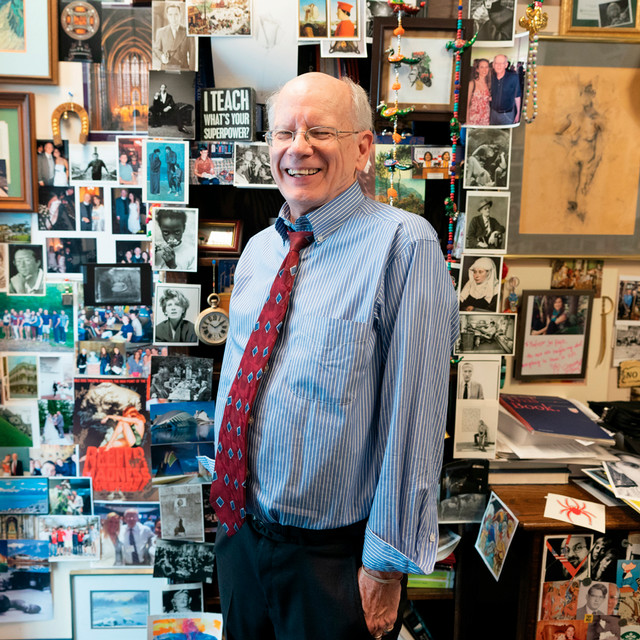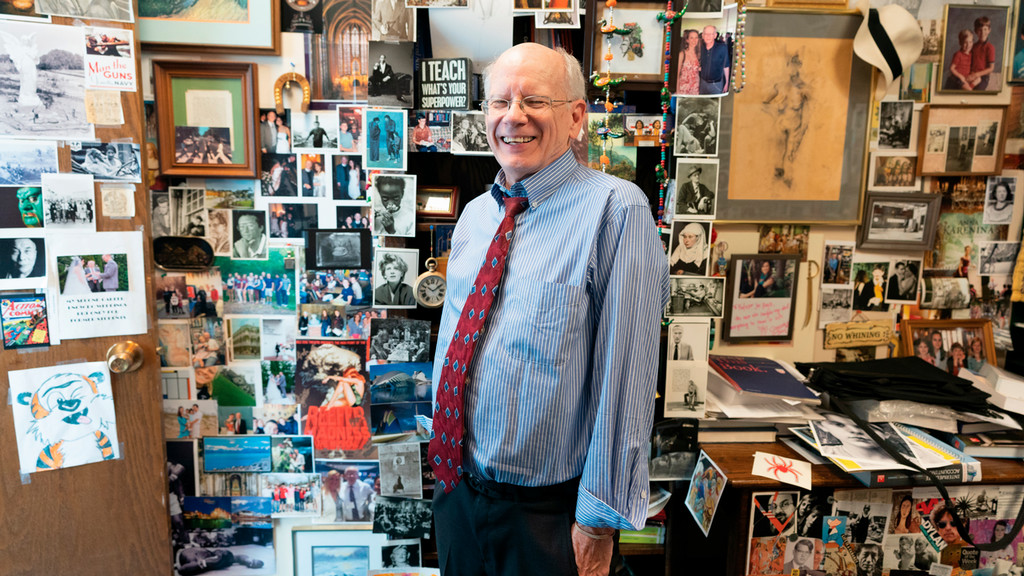THE PROFESSOR'S QUESTION WAS NOT SO SIMPLE: “Unfortunately, Ms. Abbott, we used $80,000 here, and we used $100,000 there, and we got the $50,000 back,” it began. “But we’ve still got $120,000 left of that loss, so what the heck are you going to do with that $120,000, probably?”
It was a Monday afternoon in late March, a little past the halfway point of the spring 2025 semester. Ms. Abbott — Sierra to her friends — paused. A sophomore from Massachusetts, she was sitting in one of the accounting department’s most notoriously difficult classes, ACCT 302: Intermediate Accounting II. Teaching it was one of the university’s longest-serving professors. The question, posed directly to her, put her in the hot seat.
Another factor raised the stakes further. A few feet away in the row behind her sat her mother, Jen.
The story of how Sierra Abbott faced that question in that class under those circumstances is wrapped up in another story — that of her professor, Joe Hoyle.

“So what you’re saying is the unaudited business is not worth owning?”
Hoyle began teaching accounting at Richmond in 1979. In total, he has been teaching it for 54 years and counting. On its face, accounting does not seem like a discipline poised to be ground zero for a pedagogical revolution. Hoyle is pioneering one from it anyway. To do so, he has reached back thousands of years to Socrates for inspiration. He has also looked inward, reexamining every assumption and experience he has ever had related to teaching.
“We seek innovative thinking from our students,” he writes in his book Transformative Education. “They deserve innovative thinking from us.”
As a result, his accounting classroom is unlike any other at the university and, probably, in the country. The first thing a visitor notices is that every student in the room is paying close attention nearly all of the time. There is a practical reason for this. Hoyle teaches accounting using his adaptation of the Socratic method. That is, he walks students through accounting practices, assumptions, and thinking via a stream of questions posed to individual students, one by one.
The class session in March offered a typical example of exactly how it works. After some preliminary chatter while returning assignments and then reviewing a concept from an earlier class, he dove into the topic of the day: deferred tax assets. That’s when the questions started. Over the remaining 45 minutes, the 25 students in the class collectively answered 148 questions.
Each question began the exact same way: with a student’s name. He directs each question to one of them specifically.
“I always call their name first in case they’re not paying attention,” Hoyle said later in his office. “I need to be sure they hear what I want to ask.”
When calling on each student, he uses a courtesy title and their last name. It lends a bit of formality to class in an era when many professors not only address students by first name, but invite students to address them likewise. That is not Hoyle’s style.
“If they call me Professor Hoyle, which is what I want, it’s unfair of me to call them by their first name,” he said. “I want them to know that I’m serious about this. I prepare hours for each class, even though I’ve taught for 54 years. My wife says I’m a slow learner, but I want them to know I take it seriously.”
“We seek innovative thinking from our students. They deserve innovative thinking from us.”

Every student gets multiple questions over the course of every class session. Some questions are rat-a-tat-tat requests for which figures should go where on a spreadsheet mocked up across six whiteboards in his comically bad handwriting. Some questions ask students to evaluate others’ perspectives, whether the likely stance of a company CEO or an interpretation a classmate has just delivered.
The most common question is some version of “Why?” As the lesson goes on and increases in complexity, Hoyle refers back to students’ earlier answers, positioning them as the experts upon whose expertise he is building.
When a student is stumped, he lets them off the hook quickly. He’s not interested in embarrassing anyone. He wants something more ambitious than a right answer. He wants students to understand why a right answer is right.
“I believe great classes are most often built around the teacher’s ability to craft questions that will puzzle students,” he writes in his book. “Carefully developed questions that ask for explanations like, ‘How can we do this?’ and ‘Why do we do that?’ are fabulous as a basis for learning.”
Hoyle began experimenting with the Socratic method in 1991, long before his current students were born. “I told anyone who asked,” he explained, “that I hoped to become a kinder, gentler version of Charles Kingsfield,” the archetypically brutal Harvard Law professor played by John Houseman in the 1973 film The Paper Chase. Hoyle had noticed that while students feared Kingsfield, they also worked long and hard to be prepared for class and developed a strong understanding of the complex course material. That led Hoyle to an epiphany about “what one teacher can accomplish in one class period with just two things: prepared students and good questions,” he said.
Refining the question-and-answer format over decades has borne out this insight. He has watched as it prompts students’ active involvement in their learning, a point he made in his office after his March class.

“Every single one of those students got one or more questions right by the time they walked out,” he said. “It was not a question of me simply conveying information to them. They got the answers right themselves.”
Abbott, the sophomore from Massachusetts, answered seven questions that day, including the one about the $120,000. (She correctly said that it is carried forward and reduces future tax liability.)
Sitting in the row behind her, her mother got a unique window into her daughter’s education at Richmond. A parent’s presence in a college class is, to put it mildly, unusual. Hoyle invites it. At the start of every 302 class he teaches, he invites students to provide their parents’ email addresses to him so he can communicate with them directly. It’s completely voluntary, and most students take him up on it.
Then, after the first week of classes, he sends the first of several emails to the parents. He’s been doing it since 2001. He warns them that their child is enrolled in what is “considered the most challenging course in our program and perhaps at the university as a whole.” He speaks generally about his philosophy of teaching. “In my classes, I don’t want students to view accounting as a bunch of rules to be memorized, but rather as a way of thinking.”
Federal law, he acknowledges, prevents him from discussing any student specifically without their permission, but he cautions that the students collectively will face tough challenges, and he offers advice. Simple positive encouragement, such as saying, “‘I know you are tired and frustrated, but you can learn this stuff,’ goes a long way,” he writes.
He also encourages parents to talk regularly about business-related topics: “Things that you take for granted, such as getting a loan or how employee promotions are determined, can seem foreign to even the smartest 20-year-old.” He includes a link to his book and a 2024 TEDx Talk he gave about teaching.
For Jen Abbott, Sierra’s mother, the main takeaway from his communication “was how much he loves what he does and cares about the success of his students,” she said.
That first message also invites the parents to sit in on a class session whenever they like. Between five and 10 show up over the course of an average semester. Jen Abbott worked in the visit when weekend plans to visit Sierra morphed into a Monday departure. She traveled from Massachusetts.
For the Abbotts, there was no awkwardness about mom’s presence. Jen is a teacher at the high school Sierra attended, and the pair saw each other at school every day for four years.
Watching through her teacher’s eyes, Jen came away from the class impressed. “I loved his teaching style,” she said. “Yes, he cold-called on kids, which can actually be terrifying. He was so encouraging. If they didn’t know the answer, he helped them through it. I loved the way he interacted with students. He knew all of their names. I think that’s really important. I’m really happy I got the chance [to sit in].”
Another pair of parents in class that day came with a completely different perspective. Bill and Carole Ann Rohan — parents of Brandt Rohan, ’27 — are 1996 UR graduates. Both already knew Hoyle. As an undergraduate, Carole Ann was a student with him in a Russian class. Throughout his career, Hoyle has often enrolled in courses, especially ones in which he has little or no knowledge. In addition to Russian, the subjects have included creative writing, large-format photography, and ballroom dancing. He does it “just to remind myself of what it is like to be the person in class who feels lost and confused,” he wrote on his teaching blog in 2011.

“I can balance a ledger, but here I’m just trying not to be a liability.”
For Bill, the connection with Hoyle was even closer. An accounting major at UR, he took Hoyle’s 302 class, the very class he was sitting in on in March. Today, he’s a managing director at Deloitte in the New York City metro region.
“It’s kind of ironic that the one class we get asked to attend is this class,” he said. The session felt familiar to him. “I don’t want to say it’s confrontational, but it’s an intense process. Notwithstanding that, it definitely shines through that he cares for individuals in an over-and-above way. It reminded me that he helped a lot, not just in the classroom. It was a tough class to be in, but when you got to know him, you realize he was doing it for the right reasons.”
Carole Ann, whose background is in the sciences, came away impressed in a different way. “I was surprised at how engaged I was and how much I actually learned from the class,” she said. “I was also thinking that if I was in that class, I would have been a nervous wreck.”
These are the kinds of reactions Hoyle is hoping for when he invites parents to class. “The reason I decided to start inviting parents for this particular course was because it is so flipping hard,” he said. “I hope they walk away with an excitement about their kid’s experience and say, ‘I am so happy my son or daughter came to the University of Richmond. These people are not just treating them sweetly, but they’re really pushing them to be great.’”

